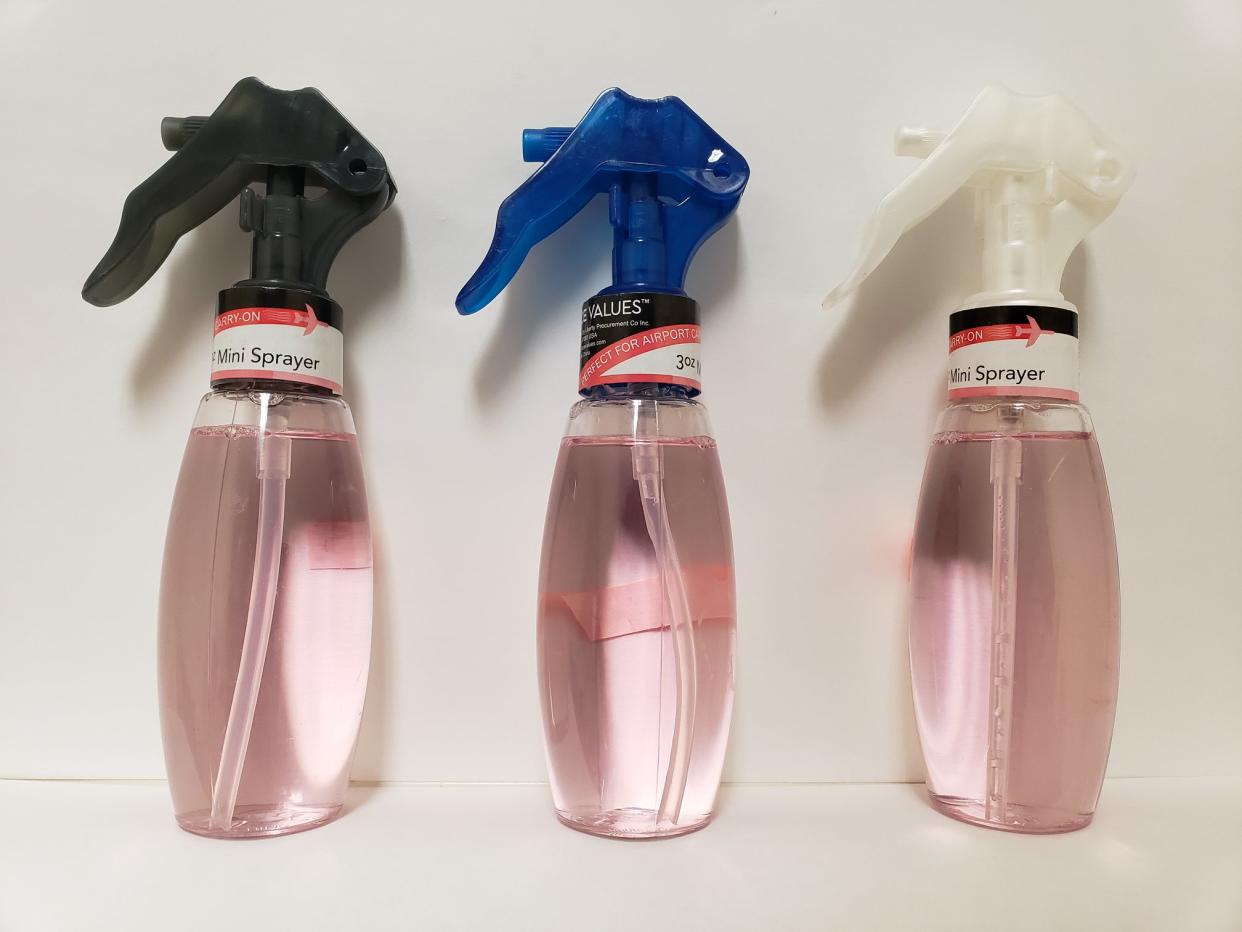Amid coronavirus concerns, police investigate mystery sanitizing spray that reportedly burned boy’s skin

The same day that New Jersey called a state of emergency to battle the coronavirus (COVID-19), a boy reportedly suffered burns to his body after using a “Spray Sanitizer” product purchased from 7-Eleven.
According to a photo of the 3-ounce nondescript pink liquid spray posted on Facebook by the River Dale Police Department, the store’s remaining bottles were seized by officers on Monday night. The bottle label simply reads, “Mini sprayer” and “Perfect for airport carry-ons.”
“While further investigation is underway, our first priority is to make the public aware that they should not use this item if they purchased it at the River Vale 7-Eleven,” River Vale Police Department Lieutenant John DeVoe said in the Facebook post. “As far as we know, this issue is limited to the River Vale store at this time. From the information that we received, approximately one dozen of the bottles were sold to customers today.”
“We understand the bigger panic caused by COVID-19 and the lack of hand sanitizing solutions,” DeVoe tells Yahoo Lifestyle, adding that buyers should return outstanding bottles to the police department.
A law enforcement official tells Yahoo Lifestyle that a preliminary investigation suggests employees may have concocted their own liquid by mixing commercially-available sanitizing products and pouring them into empty spray bottles, which were then sold for $2.49 each.
A 7-Eleven representative tells Yahoo Lifestyle in a statement, “The safety and well-being of 7-Eleven customers is of utmost importance and our hearts are with this young man at this time. This store is owned by a 7-Eleven Franchisee. Franchisees operate as independent business owners and are obligated to comply with all federal, state and local laws related to the operations of their stores. We understand the severity of this situation and are cooperating with local law enforcement. We are reviewing this matter internally and will take appropriate action. If a customer believes they purchased the product, please call the River Vale Health Department.”
To prevent exposure to the coronavirus, the Centers for Disease Control and Prevention (CDC) has recommended repeated hand washing for 20 seconds and using sanitizers containing a minimum of 60 percent alcohol. But demand for sanitizer has birthed products that erroneously claim to kill the virus, a price gauging trend and mass shortages of cleaning products as people scramble to disinfect their hands and surfaces.
According to Nielsen data provided to CNBC, national sales of hand sanitizer rose by more than 313 percent during one week in February. And in New York, where there are 173 positive cases of coronavirus statewide as of Tuesday afternoon, officials will produce 100,000 gallons per week of its own hand sanitizer, Governor Andrew Cuomo said.
A spokesperson from the Food and Drug Administration tells Yahoo Lifestyle that it cannot comment on the New Jersey case without a thorough evaluation, however included the following information: “Products regulated by FDA must meet the conditions of approval if marketed under a new drug application or, in the case of over-the-counter (OTC) drugs, such as hand sanitizers, the conditions set forth in relevant FDA regulations. OTC hand sanitizers that claim effectiveness against viruses or against disease from specific pathogens (such as Ebola, the flu, norovirus, MRSA, etc.) do not comply with an applicable FDA OTC drug monograph.”
According to a Monday press release from the FDA, the organization along with the Federal Trade Commission (FTC) sent warning letters to seven companies for selling “fraudulent COVID-19 products” The release read in part, “These products are unapproved drugs that pose significant risks to patient health and violate federal law. The FDA and FTC are taking this action as part of their response in protecting Americans during the global COVID-19 outbreak.”
“There already is a high level of anxiety over the potential spread of coronavirus,” FTC Chairman Joe Simons said in the press release. “What we don’t need in this situation are companies preying on consumers by promoting products with fraudulent prevention and treatment claims. These warning letters are just the first step. We’re prepared to take enforcement actions against companies that continue to market this type of scam.”
“There are currently no vaccines or drugs approved to treat or prevent COVID-19,” continues the press release. “Although there are investigational COVID-19 vaccines and treatments under development, these investigational products are in the early stages of product development and have not yet been fully tested for safety or effectiveness.”
The FDA also says consumers should be wary of products that “claim to prevent, mitigate, treat, diagnose or cure COVID-19” in the form of dietary supplements, drugs or medical devices.
Read more from Yahoo Lifestyle:
How to stay positive in a negative news cycle: 'We are in this together'
Coronavirus 'infodemic' prompts WHO to join forces with YouTube, TikTok to combat misinformation
A doctor breaks down the 8 things everyone should know about coronavirus
Want daily pop culture news delivered to your inbox? Sign up here for Yahoo Entertainment & Lifestyle's newsletter.

